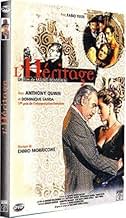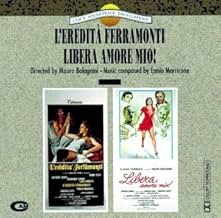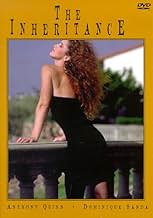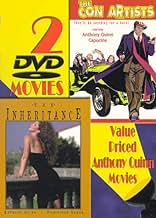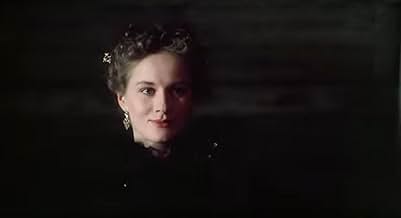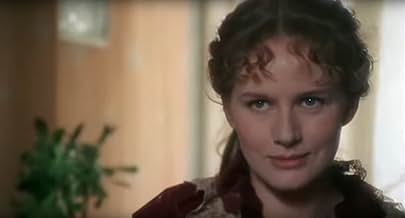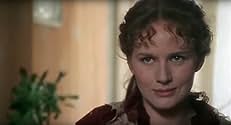NOTE IMDb
6,9/10
1,1 k
MA NOTE
Rome, 1880. Gregorio a décidé de fermer l'entreprise familiale. Il annonce à ses enfants qu'ils devront se débrouiller seuls, mais sa belle-fille, calculatrice et ambitieuse, est prête à tou... Tout lireRome, 1880. Gregorio a décidé de fermer l'entreprise familiale. Il annonce à ses enfants qu'ils devront se débrouiller seuls, mais sa belle-fille, calculatrice et ambitieuse, est prête à tout pour toucher l'héritage..Rome, 1880. Gregorio a décidé de fermer l'entreprise familiale. Il annonce à ses enfants qu'ils devront se débrouiller seuls, mais sa belle-fille, calculatrice et ambitieuse, est prête à tout pour toucher l'héritage..
- Réalisation
- Scénario
- Casting principal
- Récompenses
- 2 victoires et 2 nominations au total
Gigi Proietti
- Pippo Ferramonti
- (as Luigi Proietti)
Harold Bromley
- Andrea Barbati
- (as Harald Bromley)
Simone Santia
- Armando Carelli
- (as Simone Santo)
Angelo Lanza di Trabia
- Court House Judge
- (non crédité)
Vezio Natili
- Taverna Keeper
- (non crédité)
Lamberto Solfa
- Judge
- (non crédité)
Avis à la une
This is a compelling drama about an Italian family in the 1880's. Papa (Anthony Quinn) closes down the long-standing Ferramonti bakery and informs his two sons Pippo and Mario and daughter Teta that they will have to fend for themselves in future. Irene his daughter-in-law under the guise of reconciling the family feuds maps out a plan to grab the inheritance for herself. Beautiful Dominique Sanda plays Irene as a shy serene young temptress using her charm and personal magnetism to good effect as she manipulates her lover and family members as cunningly as in a game of chess. The fascination of this movie is to watch Irene at work and to anticipate her next clever move. Irene convinces the family that they must at all costs prevent Papa from marrying again as that would certainly mean the loss of their inheritance. Anthony Quinn plays the patriarch as a bitter and arrogant man in search of love and affection (impeccably acted!) Irene sees that her way to the top and the family fortune is ready for her. Good-looking Mario with his smouldering dark eyes is entrapped by Irene's remarkable beauty and she in turn submits to his advances thus misleading the family of her real intentions. It's a completely fascinating drama that is truly absorbing from beginning to end. As in a game of chess, a sudden and unexpected move can change the outcome of the game. A dramatic confrontation near the end of the film sends the Ferramonti family headlong into a new course of action which quickly resolves the problem of the inheritance. Dominique Sanda (Winner Best Actor Cannes Film Festival) is not only a superb actor but has a beautiful presence in all her scenes. I thought the supporting cast were also brilliant in their various roles. I thoroughly recommend this movie, not only for its great acting and talented direction, but also for its lavish presentation.
L'eredità Ferramonti envelops viewers in the opulent yet oppressive world of late 19th-century Rome, where family ties are knotted with ambition and betrayal. The film's atmosphere is defined by a sense of simmering tension, as the Ferramonti family's stately interiors and candlelit corridors become a stage for power plays and emotional subterfuge. The cinematography by Ennio Guarnieri is evocative, capturing both the grandeur of Rome's monuments and the claustrophobia of familial conflict. Rich Eastmancolor tones and meticulous period detail lend the film a visual lushness, though at times the camera lingers too long on surface beauty, risking a sense of detachment from the characters' inner turmoil.
Anthony Quinn, as the patriarch Gregorio, commands the screen with a forceful presence, delivering a performance that oscillates between gruff authority and quiet vulnerability. Dominique Sanda, whose turn as the cunning Irene earned her the Cannes Best Actress award, is the film's undeniable standout. Her portrayal is both magnetic and chilling, imbuing Irene with a calculated poise that makes her machinations as fascinating as they are unsettling. Fabio Testi and Gigi Proietti, as the Ferramonti sons, provide solid support, though their roles sometimes feel overshadowed by the central conflict between Quinn and Sanda. Adriana Asti, as Teta, adds nuance to the ensemble, her presence hinting at wounds left by family tradition.
Despite its strengths, the film is not without flaws. The narrative occasionally stumbles with disjointed scenes and abrupt tonal shifts, which can make the emotional stakes feel inconsistent. Some plot developments lack cohesion, and the finale may strike viewers as unsatisfying or rushed, undermining the carefully built tension. Still, Ennio Morricone's sensitive score and the film's lavish production values maintain engagement, even when the story falters.
Anthony Quinn, as the patriarch Gregorio, commands the screen with a forceful presence, delivering a performance that oscillates between gruff authority and quiet vulnerability. Dominique Sanda, whose turn as the cunning Irene earned her the Cannes Best Actress award, is the film's undeniable standout. Her portrayal is both magnetic and chilling, imbuing Irene with a calculated poise that makes her machinations as fascinating as they are unsettling. Fabio Testi and Gigi Proietti, as the Ferramonti sons, provide solid support, though their roles sometimes feel overshadowed by the central conflict between Quinn and Sanda. Adriana Asti, as Teta, adds nuance to the ensemble, her presence hinting at wounds left by family tradition.
Despite its strengths, the film is not without flaws. The narrative occasionally stumbles with disjointed scenes and abrupt tonal shifts, which can make the emotional stakes feel inconsistent. Some plot developments lack cohesion, and the finale may strike viewers as unsatisfying or rushed, undermining the carefully built tension. Still, Ennio Morricone's sensitive score and the film's lavish production values maintain engagement, even when the story falters.
'L'eredità Ferramonti' (whose English title is 'The Inheritance') made in 1976 is one of the latest films in Mauro Bolognini's directing career. His name is less mentioned today, being overshadowed by those of his more famous contemporaries, but in the decades after World War II Bolognini was a prolific director and made several successful films, some of them not without controversies, including a two-month prison sentence for 'indecency' in 1965. 'The Inheritance' is an epoch drama set in late 19th-century Rome, an interesting film to watch today, primarily thanks to his international cast but also cinematic qualities that prove that Bolognini was a first-rate professional in a mature cinematography.
It's a classic family saga combined with a terrible fight for inheritance. The Rome of the ascending bourgeoisie after the formation of the Italian state is the background of the action. Old Gregorio Ferramonti (Anthony Quinn) sells out his bakery which helped him gather a beautiful fortune, but he is in no hurry to share his inheritance. The three children - daughter Teta (Adriana Asti) married to a government official also an aspiring politician, son Mario (Fabio Testi) a speculator with a reputation of a Don Juan, and second son Pippo (Gigi Proietti) a blacksmith seller a bit fluffy and a bit insecure, are all disappointed, because they could use the money in the conditions of the capitalist expansion of the new Italy, but they don't have many alternatoves, because the old man seems determined to live his own life comfortably. Emerges Irene (Dominique Sanda), Pippo's beautiful and ambitious new wife, who will take the initiative in the attempt to seize the old man's fortune. The road to his money is paved with a lot of passion, infidelity, treason. This is not a classical Italian family saga. In the Ferramonti family, money seems to be more important than the feelings or the unity of the family.
The story is specific to the great social and naturalistic novels describing the rise of the bourgeoisie and the personal price paid by heroes to succeed in the conditions of the savage capitalism in the second half of the 19th century Europe. Gaetano Carlo Chelli the author whose book inspired the film was a contemporary of Emile Zola, and the excellent cinematography of the film, with a Rome shrouded in fog, populated by women fastened in corsets within elegant dresses and sumptuous hats recalls the paintings of the French Impressionists. The cast is dominated by international celebrities, with Dominique Sanda playing a memorable role as the beautiful, ambitious, sensual Irene who conquers and destroys one after another all the men in the family. The role brought her an award at Cannes, by the way. For Anthony Quinn, the role in this film is not one of his great roles, but I think it met expectations. Other aspects of production are not as successful. I was especially surprised by how conventional the music of Ennio Morricone sounds, a disappointment from the composer of so many soundtracks and memorable musical themes. The style of music composed for this film with violins in the key scenes seems old-fashioned for a film of the '70s, late by two or three decades. There are however plenty of good reasons to see today "The Inheritance'. It's not a masterpiece, but it's a film that stands the test of time. The saga of the Italian family falling apart due to the fight for money, the passions of men in two generations fascinated by the same woman, and the landscape of Rome at the end of the century remain with the spectators after the end of the viewing.
It's a classic family saga combined with a terrible fight for inheritance. The Rome of the ascending bourgeoisie after the formation of the Italian state is the background of the action. Old Gregorio Ferramonti (Anthony Quinn) sells out his bakery which helped him gather a beautiful fortune, but he is in no hurry to share his inheritance. The three children - daughter Teta (Adriana Asti) married to a government official also an aspiring politician, son Mario (Fabio Testi) a speculator with a reputation of a Don Juan, and second son Pippo (Gigi Proietti) a blacksmith seller a bit fluffy and a bit insecure, are all disappointed, because they could use the money in the conditions of the capitalist expansion of the new Italy, but they don't have many alternatoves, because the old man seems determined to live his own life comfortably. Emerges Irene (Dominique Sanda), Pippo's beautiful and ambitious new wife, who will take the initiative in the attempt to seize the old man's fortune. The road to his money is paved with a lot of passion, infidelity, treason. This is not a classical Italian family saga. In the Ferramonti family, money seems to be more important than the feelings or the unity of the family.
The story is specific to the great social and naturalistic novels describing the rise of the bourgeoisie and the personal price paid by heroes to succeed in the conditions of the savage capitalism in the second half of the 19th century Europe. Gaetano Carlo Chelli the author whose book inspired the film was a contemporary of Emile Zola, and the excellent cinematography of the film, with a Rome shrouded in fog, populated by women fastened in corsets within elegant dresses and sumptuous hats recalls the paintings of the French Impressionists. The cast is dominated by international celebrities, with Dominique Sanda playing a memorable role as the beautiful, ambitious, sensual Irene who conquers and destroys one after another all the men in the family. The role brought her an award at Cannes, by the way. For Anthony Quinn, the role in this film is not one of his great roles, but I think it met expectations. Other aspects of production are not as successful. I was especially surprised by how conventional the music of Ennio Morricone sounds, a disappointment from the composer of so many soundtracks and memorable musical themes. The style of music composed for this film with violins in the key scenes seems old-fashioned for a film of the '70s, late by two or three decades. There are however plenty of good reasons to see today "The Inheritance'. It's not a masterpiece, but it's a film that stands the test of time. The saga of the Italian family falling apart due to the fight for money, the passions of men in two generations fascinated by the same woman, and the landscape of Rome at the end of the century remain with the spectators after the end of the viewing.
A charming film, set in 1880's Rome. It's a little different. Dominique Sanda was excellent, mixing a child-like innocent look with the scheming greed of a woman. Her beauty really adds to this film. The sniveling Pippo and Mario, and the pompous Paolo, were pretty good roles. I've never heard of the Italian actors who played them. Anthony Quinn was good, totally becoming his character. The ending, while not shocking, was unexpected. The version I saw was dubbed into English. Something odd about this and other Italian films I've seen. It looks like (from the lip movement) that some of the actors are speaking in Italian and others are speaking in English. Maybe the dubbing and translation was just done that well. This is certainly a film worth seeing once.
This superbly shot&acted creation is,like most of Bolognini,unjustly overlooked,while it reaffirms that Italian cinema is loaded with genius besides Fellini,Visconti and Pasolini. The plot is a criticism at the savage nineteenth century capitalism,its cruelty and shallowness,placed in turn of century Rome,dealing with the ruthlessness of the Italian high bourgeoisie in their pursuit of wealth. Old Ferramonti-Anthony Quinn in yet another stunning "tour De force" of his incomparable acting-is a thrifty millionaire,which,after forty years of service,closes down the bakery which brought him wealth at the expense of overworked and underpaid workers and cheated customers. This bitter and ruthless old man is a conservative patriarch and tyrannical father and so totally Quinn:both in real life and in films like The Greek Tycoon,or the more conventional Revenge or A walk in the clouds,nothing suits Anthony Quinn best than being an unbearably rough,strong-willed and dictatorial,yet strangely charismatic "pater familiae". But Ferramonti is at such a degree authoritarian and fond of his money(which he doesn't share not even with his family,not even spends on himself,preferring to live frugally while his millions are piling up)that he negatively influenced the life of his children,now all of them grown up,yet still treated like children by him:Pippo,his most submissive son,is simply cut off from his share,tough he was the only one to work alongside with his father in the bakery and even contributed to the old man's fortune;Mario,the more wild tempered son,became a gambler living out of risky speculation at the stock exchange,enjoying a questionable short term prosperity;while Teta,the family's only daughter ran away from home and married only to escape her father's fits,her marriage to a man disliked by her father making matters only worse.The strange thing is that the old man doesn't have any paternal feelings for his children whatsoever,he is seeing them only as a potential threat,as competitors,as enemies wanting his hard-earned money. Shortly after wards Pippo marries the beautiful Irene,which like him,grew up in a wealthy yet austere environment.Irene is more ambitious than her husband and her marriage starts in a promising way,the couple's financial situation prospering and above that,she manages to reconcile the family. However one soon gets to see this woman's real face-Dominique Sanda,an iconic figure of the seventies,brilliantly mingles a flawless ingénue looks with cool,distant Garbo-style cynicism and manipulative,haunting magnetism in this part-as Irene soon shamelessly starts an affair with her brother-in-law,tough it is first unclear if due to the sexual charisma of this elegant man or just the need to acquire his protection and connections in order to succeed in the Roman high society. She even manages to enthrall the Old Ferramonti,who ends up by loving her more than his children,meticulously planning every attack which step by step takes her closer to the old man's millions(this is actually the only why she married Pippo,knowing that he will be her gateway to a fabulous fortune).Strangely at first,everybody in the family is trusting her and her contacts with the old man,thinking that she can be used as a middle man between the disinherited children and their brutal father. As it happens in love-stories where two or more brothers love the same woman,for instance Brothers Karamazov or Legends of the fall,things will take very dramatic turn,comparable to the films above,Irene managing to destroy,partly unintentional,partly purposely both Pippo and Mario,just trying to control them.Eventually her plans to keep the fortune for herself only will finally be stopped for good by her sister-in-law and her husband who end up as only heirs,ironically they weren't better than her,just "respectable mediocrities". The achievements of this film are countless:besides the good acting of Fabio Testi and Luigi Proietti as Mario and Pippo(two of Italy's most famous and talented actors),only to be overshadowed by the performances of Dominique Sanda and Quinn,who both are depicting the same kind of characters-passionate at an almost pathological scale for money and power,yet cruelly cold and calculating while pursuing their interest,the beautiful interiors of the opulent Italian bourgeoisie and the stunning soundtrack by-who else than Morricone. The only minuses might be that some sets sometimes look somewhat shabby in their nostalgic period-piece style,that gestures are too theatrically overblown and that there is a typically European,uncensored amount of-not too appealing,more destroying the film's beauty than enthralling-nudity. Nevertheless worth watching,both as trip back in visually overwhelming era and as a lesson that capitalistic greed is not necessarily a modern invention.
Le saviez-vous
- Citations
Irene Carelli Ferramonti: Aren't you going to kiss me, Papa?
Gregorio Ferramonti: I'm not your Papa.
- ConnexionsReferenced in Something Short of Paradise (1979)
Meilleurs choix
Connectez-vous pour évaluer et suivre la liste de favoris afin de recevoir des recommandations personnalisées
- How long is The Inheritance?Alimenté par Alexa
Détails
- Durée2 heures
- Mixage
- Rapport de forme
- 1.66 : 1
Contribuer à cette page
Suggérer une modification ou ajouter du contenu manquant

Lacune principale
By what name was L'héritage (1976) officially released in Canada in English?
Répondre
